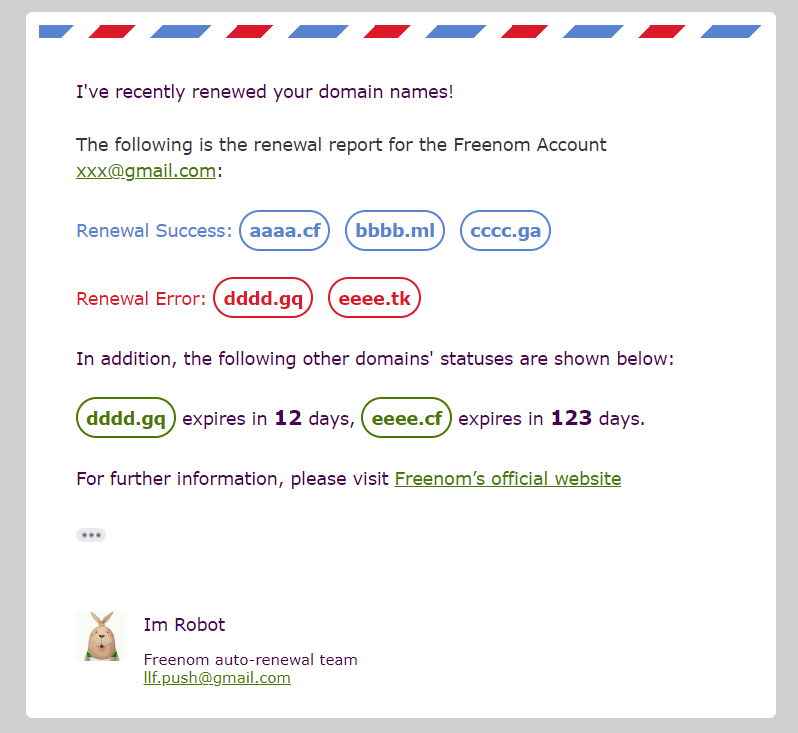🐳 Deployment via docker (This is the recommended deployment method)
As we all know, Freenom is the only merchant on the planet that provides free top-level domain names, but it needs to be renewed every year for up to one year at a time. Since I applied for a bunch of domain names, and not at the same time, So I felt frustrated every time I renewed, so I wrote this automatic renewal script.
Thanks for non-commercial open source development authorization by JetBrains.
Whether the renewal is successful or unsuccessful or the script executes with an error, you will receive a notification from the script. In case of renewal success or failure related notifications, the notification will include the number of days to expiration for the unrenewed domain name, etc. The content of the notification email is shown here.
- Email of robot: Used to send notification emails.
- Your email: Used to receive notification emails sent by robots.
- VPS: Any server can be used. The system recommends
Debian, and the PHP version must bephp7.3or above. - No more
It is recommended to open the privacy mode of your browser and then log in to gmail to set up the settings, to prevent you from not being able to jump to the correct settings URL when you have multiple gmail accounts.
1.In Settings > Forwarding and POP/IMAP, tick
- Enable POP for all messages
- Enable IMAP
Then save your changes.
2.Enable two-step verification
Refer to the official document: Turn on 2-Step Verification
3.Configure login with application-specific password
Refer to the official document: Sign in with App Passwords
Because Gmail no longer supports "insecure login", you can only use the account plus application-specific password to login now.
After the above operation is finished, set MAIL_USERNAME and MAIL_PASSWORD to your mailbox and application-specific
password in .env file, set TO to your incoming mailbox, and then set the value of MAIL_ENABLE to 1 to enable the
mailbox delivery function.
If you don't want to use email related features, change the value of MAIL_ENABLE in the .env file in the root
directory to 0 to turn off the email push method.
If you don't want to use email push, you can also use Telegram bot. In the .env file, Change the value
of TELEGRAM_BOT_ENABLE to 1 to enable the Telegram bot. Similarly, change the value of MAIL_ENABLE to 0 to
disable the mail push method. Telegram bot has two configuration items, one is chat_id (corresponding
to TELEGRAM_CHAT_ID in .env file), You can get your own id by sending /start to @userinfobot using your Telegram
account, The other is token (corresponding to TELEGRAM_BOT_TOKEN in the .env file), your Telegram bot token, how
to create a Telegram bot and how to get the token please refer to:
Official Document
The next step is to start describing how to deploy this script, there are two ways to deploy it, one is to pull the code and deploy it directly, the other is to deploy it via docker. We recommend deploying via docker, it's easy and hassle-free.
Deployment via docker is our recommended deployment method. For detailed deployment steps, please visit: https://hub.docker.com/r/luolongfei/freenom
There is a detailed description in the docker repository documentation, and the whole deployment process is quite simple.
We don't recommend this deployment method as it requires certain environment requirements to be met for direct code pull deployment.
All operations are performed under Centos7 system, other Linux distributions are similar
$ mkdir -p /data/wwwroot/freenom
$ cd /data/wwwroot/freenom
# clone the repository source
$ git clone https://github.com/luolongfei/freenom.git ./# Copy configuration file template
$ cp .env.example .env
# Edit configuration file
$ vim .env
# .env Each item in the file has a detailed description, which will not be repeated here. In short, you need to change all the items in it to your own. Note the format of the multi-account configuration:
# e.g. MULTIPLE_ACCOUNTS='<account1>@<password1>|<account2>@<password2>|<account3>@<password3>'
# Of course, if you only have a single account, you only need to configure FREEENOM_USERNAME and FREEENOM_PASSWORD. The configurations of single account and multiple accounts will be read together and duplicated.
# After editing, press "Esc" to return to the command mode, enter ":wq" and press Enter to save and exit. If you don't use vim editor, you can ask Uncle Google. :)$ yum -y install cronie crontabs
# Verify if crond is installed and started
$ yum list cronie && systemctl status crond
# Verify that crontab is installed
$ yum list crontabs $$ which crontab && crontab -l$ crontab -e
# Task content is as follows
# The meaning of this task is to execute the run file under /data/wwwroot/freenom/ at 9 AM every day
# Note: In some cases, crontab may not find your php path. The following command will output an error message in the freenom_crontab.log file. You should specify the php path: replace the following php with /usr/local/php/bin/php (based on the actual situation)
00 09 * * * cd /data/wwwroot/freenom/ && php run > freenom_crontab.log 2>&1Restart the crond daemon (This step is required each time you edit the task form for the task to take effect)
$ systemctl restart crondTo check if the Task is normal, you can set the execution time of the above task to a few minutes, and then wait until
the task execution is completed, check the contents of the freenom_crontab.log file in the /data/wwwroot/freenom/
directory for errors. Common error messages are as follows:
- /bin/sh: php: command not found
- /bin/sh: /usr/local/php: Is a directory
(Click to expand or collapse)
solution
execute
$ whereis php # Determine the location of php, the general output is "php: /usr/local/php /usr/local/php/bin/php", we choose: /usr/local/php/bin/phpNow we know that php's path is
/usr/local/php/bin/php(may be different according to the actual situation of your own system), and then modify the commands in the form task, change
00 09 * * * cd /data/wwwroot/freenom/ && php run > freenom_crontab.log 2>&1to
00 09 * * * cd /data/wwwroot/freenom/ && /usr/local/php/bin/php run > freenom_crontab.log 2>&1More information: click here
Of course, if your crontab can correctly find the php path without error, you don't need to do anything.
So far, all the configurations have been completed, let's verify if the whole process works :)
You can first change the value of NOTICE_FREQ in .env to 1 (Push notification every time the script is executed),
and then execute
$ cd /data/wwwroot/freenom/ && php runIf nothing else, you will receive an email about the domain name.
End of the section on script deployment.
If you encounter any problems or bugs, please mention issues. If freenom changes the algorithm and causes this project to fail, Please mention issues to inform me that I will fix it in time and maintain this project for a long time. Welcome star ~
If you find this project helpful, please consider supporting the project going forward. Your support is greatly appreciated.
PayPal: https://www.paypal.me/mybsdc
Every time you spend money, you're casting a vote for the kind of world you want .-- Anna Lappe
- Main program and framework: @luolongfei
- English document: @肖阿姨
- The project relies on third-party libraries such as PHPMailer , guzzle, etc.
- The project Docker related documentation has reference to the article by 秋水逸冰
- @anjumrafidofficial Improve the English mail content








